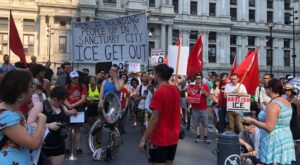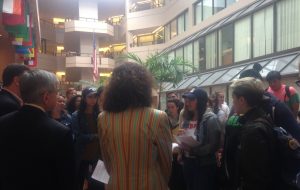Hoyas for Immigrant Rights (HFIR) hosted its sixth annual UndocuWeek events beginning April 18 to educate, support, and raise awareness for undocumented students on Georgetown’s campus. The weeklong series is the first in two years to take place on campus after pandemic disruptions.
“The mission of UndocuWeek is ultimately to raise awareness and create a more inclusive campus,” Jenny Park (COL ’24), HFIR programming director, said. “We’re not looking to out anyone or single out a specific community, especially since being undocumented and other issues related to status fall on such a wide spectrum.” HFIR’s larger mission includes promoting awareness, building safe spaces, and elevating the voices of immigrant students in the broader Georgetown community.
Organizers emphasized that UndocuWeek is especially important at a predominantly white institution such as Georgetown. “I do not think being undocumented is an identity that is discussed frequently at this school, and UndocuWeek gives us the opportunity to bring light to certain issues and ways that we can improve as a community to become more welcoming and accessible,” HFIR secretary Katherine Hawes (SFS ’25) said.
This year’s events included tabling at Red Square, a Pre-Professional/Know Your Rights/How to Be a Good Ally panel, a Tea Talk with the Georgetown University Vietnamese Student Association (GUVSA), and a Last Day Gala. La Casa Latina also held a crafting and movie night where students crafted butterflies—common symbols of long migration journeys—with messages in support of the immigrant community.
Every UndocuWeek event featured food from a variety of cuisines: falafel, wings, egg rolls, bubble tea, and Dominican food. “Everyone loves free food and drinks, and they help create a welcoming, safe space as well as celebrate cultural diversity,” GUVSA internal vice president Yuki Cui (NHS ’23) said.
The Pre-Professional/Know Your Rights/How to Be a Good Ally panel featured guest speakers Juan Belmán Guerrero, the program manager of the Kalmanovitz Initiative for Labor and the Working Poor; Alicia M. de la O, an immigration attorney with Catholic Charities; and Jennifer Crewalk, the associate director for Undocumented Student Services at Georgetown’s Center for Multicultural Equity and Access.
The panel connected students with resources and opportunities at the undergraduate, postgraduate, and professional levels, and featured an educational conversation about productive allyship. “The panelists discussed how to intentionally create communities that are open and welcoming to people of all backgrounds, and then we had the chance to reflect on what matters most to us and what inspires us to do the work that we do,” Hawes said.
“We felt allyship was an important topic to include because we’re trying to educate the campus as a whole,” Park added.
The GUVSA x HFIR Tea Talk, a discussion on immigrant rights and student experiences, highlighted the intersectionality of immigrant issues. “Topics like immigrant rights have a lot of intersectionality,” Cui said. “A lot of us in VSA are first-generation immigrants, so we thought it would be fitting to work with HFIR to create a space to empower voices that are usually marginalized.”
Conversations were at the center of many UndocuWeek events, which, according to organizers, allowed people to come together and share their backgrounds.
“It’s really important for people from different backgrounds to be able to sit together and share personal experiences so that people can speak their minds but also listen and grow as individuals,” Cui said.
The events also created a more formal environment for spaces dedicated to discussing issues undocumented students face and immigrants’ experiences, which some attendees had not found elsewhere on campus.
“The Tea Talk allowed me to not only have a discussion that encompassed both of my identities as a first-gen student and Vietnamese-American, but it also informed me of the experiences of those from other backgrounds and how their identities can impact them,” Ariel Le (NHS ’24), HFIR social media manager and GUVSA historian, said. “There aren’t many formal spaces where I can have these conversations at Georgetown.”
Ishaan Kumar (COL ’24), who attended the GUVSA x HFIR Tea Talk to show solidarity with students of various documentation statuses, shared his experience of the event. “My parents moved to the U.S. so that my sister and I could be born with American citizenship, so I understand how big of a privilege status can be,” Kumar said. “I had never attended a Tea Talk before, so I had no idea what to expect, but it was comforting to realize that as immigrants, we all had so many shared experiences, thoughts, and feelings. I walked away feeling like there truly was a community on campus for us.”
Transitioning back to campus after more than a year away was not without its challenges. According to organizers, turnout was lower than expected among the student body, in part a result of declining membership.
“There was more we could have done as a club in terms of attendance, but I think this was also a really busy week for a lot of people,” Park said. She also explained the effects of COVID-19 on HFIR as a whole. “HFIR used to be a really big club, but since the pandemic, membership has dwindled a lot,” Park said.
Despite this, HFIR still stands strong in its advocacy mission, according to Park. Outside of UndocuWeek, students can find HFIR tabling in Red Square and hosting various events on- and off-campus.
“Even if people don’t directly participate, we still exist for them as an unconditional safe space,” Park said. “Your status is something very personal, and having us be here, and having a space where there are a group of students who are actively fighting and advocating on everyone’s behalf makes for a more inclusive campus.”






